Hysan Deguo Porous Capsicum | Capsicum Plaster while Breastfeeding

What is Hysan Deguo Porous Capsicum | Capsicum Plaster used for?
Brief: External Analgesic
I am currently breastfeeding and I want to know if using Hysan Deguo Porous Capsicum | Capsicum Plaster is safe for my kid? Does it have any effect on milk production?

Hysan Deguo Porous Capsicum | Capsicum Plaster Breastfeeding Analsys
Capsicum while Breastfeeding
Low RiskCAS Number: 84625-29-6
Capsaicin is an oleoresin contained in ripe and dry fruits of hot peppers. It is used for seasoning food and as medicine for topical analgesia in the form of creams, gels or patches. A low absorption into plasma (very low levels or undetectable in plasma) and rapid clearance make it highly unlikely the passage of significant amount toward breast milk. Do not apply on the chest or thoroughly clean it off before breastfeeding.
Hysan Deguo Porous Capsicum | Capsicum Plaster Breastfeeding Analsys - 2
Capsicum while Breastfeeding
CAS Number: 84625-29-6
Cayenne peppers (Capsicum species) contain capsaicin and related compounds which cause the hot, spicy flavor, as well as numerous other components. Capsicum has no specific lactation-related uses and no information is available on the excretion of Capsicum components in breastmilk. Capsicum is "generally recognized as safe" (GRAS) as a food by the U.S. Food and Drug Administration. Oral ingestion can cause gastrointestinal irritation and has caused skin rashes in the breastfed infants of women who eat foods spiced with red peppers.[1] Capsicum may increase the risk of bleeding and should be used cautiously in patients taking anticoagulant or antiplatelet medications. Cross reactions can occur in those allergic to members of the Solanaceae family of plants (e.g., potatoes, tomatoes, paprika, Jimson weed). Capsaicin is used topically for pain. Application of Capsicum or capsaicin to the mother's skin should not affect the infant as long as the infant's skin does not come into direct contact with the areas of skin that have been treated. Do not apply capsaisin cream to the breast.Dietary supplements do not require extensive pre-marketing approval from the U.S. Food and Drug Administration. Manufacturers are responsible to ensure the safety, but do not need to the safety and effectiveness of dietary supplements before they are marketed. Dietary supplements may contain multiple ingredients, and differences are often found between labeled and actual ingredients or their amounts. A manufacturer may contract with an independent organization to verify the quality of a product or its ingredients, but that does certify the safety or effectiveness of a product. Because of the above issues, clinical testing results on one product may not be applicable to other products. More detailed information #about dietary supplements# is available elsewhere on the LactMed Web site.
What should I do if I am breastfeeding mother and I am already exposed to Hysan Deguo Porous Capsicum | Capsicum Plaster?
Hysan Deguo Porous Capsicum | Capsicum Plaster is in the category of low risk, if you have already used it then its not a big deal if health and behavior of baby is good. However your health care provider shall be aware of the fact that you have used Hysan Deguo Porous Capsicum | Capsicum Plaster so you should inform him based on your convenience.
My health care provider has asked me to use Hysan Deguo Porous Capsicum | Capsicum Plaster, what to do?
Though Hysan Deguo Porous Capsicum | Capsicum Plaster dose not comes in category of safe drugs rather it comes in category of low risk but if your doctor is aware that you are breastfeeding your baby and has still recommended it then its advantages must be outweighing the risks.
If I am using Hysan Deguo Porous Capsicum | Capsicum Plaster, will my baby need extra monitoring?
Not much monitoring required while using Hysan Deguo Porous Capsicum | Capsicum Plaster
Who can I talk to if I have questions about usage of Hysan Deguo Porous Capsicum | Capsicum Plaster in breastfeeding?
US
National Womens Health and Breastfeeding Helpline: 800-994-9662 (TDD 888-220-5446) 9 a.m. and 6 p.m. ET, Monday through Friday
UK
National Breastfeeding Helpline: 0300-100-0212 9.30am to 9.30pm, daily
Association of Breastfeeding Mothers: 0300-330-5453
La Leche League: 0345-120-2918
The Breastfeeding Network supporter line in Bengali and Sylheti: 0300-456-2421
National Childbirth Trust (NCT): 0300-330-0700
Australia
National Breastfeeding Helpline: 1800-686-268 24 hours a day, 7 days a week
Canada
Telehealth Ontario for breastfeeding: 1-866-797-0000 24 hours a day, 7 days a week
